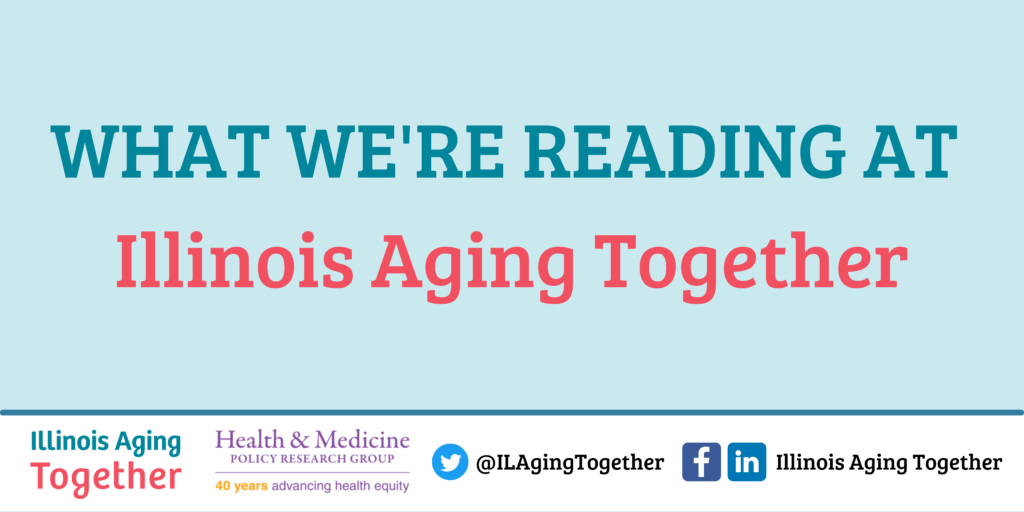
What We’re Reading at the Center for Long-Term Care Reform and Illinois Aging Together
Health & Medicine Policy Research Group’s Center for Long-term Care Reform and Illinois Aging Together campaign are dedicated to advancing policies and structures that improve the conditions in which Illinoisans live, work, play, and age across the life course. Through our work, it is crucial for us to stay abreast of current events, developments, and stories in the aging and health sectors–and beyond.

Below are some of the recent articles that we found most pertinent to our work:
Low-wage workers prop up the nursing home industry. They’re quitting in droves. (Rebecca Tan, Washington Post)
“Frustration is surging among the low-wage workers who make up the backbone of the nursing home industry, as tens of thousands of their colleagues call out sick with covid-19, inflaming shortages that already were at crisis levels. Hailed as “heroes” during the early months of the pandemic, these workers, most of whom are women and people of color, say they’re facing untenable levels of pressure.”
Rethinking the urban physical environment for century-long lives: from age-friendly to longevity-ready cities (Chenghao Wang, Diego Sierra Huertas, John W. Rowe, Ruth Finkelstein, Laura L. Carstensen & Robert B. Jackson, Nature Aging)
In response to increasing life expectancies and urbanization, initiatives for age-friendly cities seek to facilitate active and healthy aging by strengthening supports and services for older people. While laudable, these efforts typically neglect early-life exposures that influence long-term well-being. With a focus on the urban physical environment, we argue that longevity-ready cities can accomplish more than initiatives focused solely on old age. We review features of cities that cumulatively influence healthy aging and longevity, discuss the need for proactive interventions in a changing climate, and highlight inequities in the ambient physical environment, especially those encountered at early ages, that powerfully contribute to disparities in later life stages. Compared with strategies aimed largely at accommodating older populations, longevity-ready cities would aim to reduce the sources of disadvantages across the life course and simultaneously improve the well-being of older people.
Cash Aid to Poor Mothers Increases Brain Activity in Babies, Study Finds (Jason DeParle, The New York Times)
“A study that provided poor mothers with cash stipends for the first year of their children’s lives appears to have changed the babies’ brain activity in ways associated with stronger cognitive development, a finding with potential implications for safety net policy.”
COVID-19 Again Hits Illinois Prisons, Exacerbating Long-Standing Failures in Medical and Mental Health Care (Daniel C. Vock, Better Government Association)
“COVID-19 is once again sweeping through Illinois’ prisons, sickening thousands of Illinois prisoners and hundreds of staff members. And while hospitalizations have been rare during the latest wave, state prison officials are struggling to keep a lid on the infection rate.”
Old-age Justice and Black Feminist History: Sojourner Truth’s and Harriet Tubman’s Intersectional Legacies (University of Virginia’s Department of Women, Gender, & Sexuality )
“ To date, intersectional scholars have paid much more attention to youth than to old age, building a vibrant interdisciplinary field of black girlhood studies that makes visible how black girls define and value themselves, how their experiences differ from those of white girls or black boys, and how they challenge institutions and political frameworks that construe them as problems when they know full well that racism, sexism, and classism are the issues that must be addressed.4 But what of old black womanhood? How might attention to the category “old black woman” transform the ways that we understand large-scale structures such as colonialism, slavery, and capitalism? How do black women draw on their embodied experiences of later life to articulate justice claims distinct from those promoted by younger black women and black girls?”
Vaccine Hesitancy Has Seeped Into Home Health Care (Marion Renault, The Atlantic)
“Many direct-care workers are unsure about the COVID-19 vaccines, leaving the people who depend on their labor that much more vulnerable.”
An honest look at the personal finance crisis (TED, featuring speaker Elizabeth White)
Medicare patients win the right to appeal gap in nursing home coverage (Susan Jaffe, Kaiser Health News )
Socioeconomic status only modestly influences readmissions, Yale study finds (Lisa Gillespie, Modern Healthcare)
ThedaCare scraps lawsuit to prevent employees from leaving for Ascension (Tara Bannow, Modern Healthcare)

